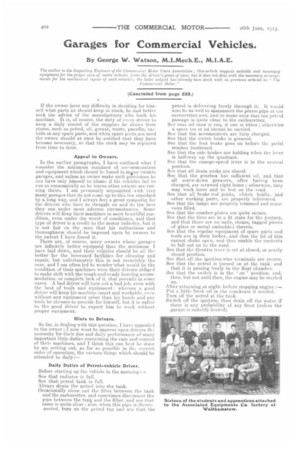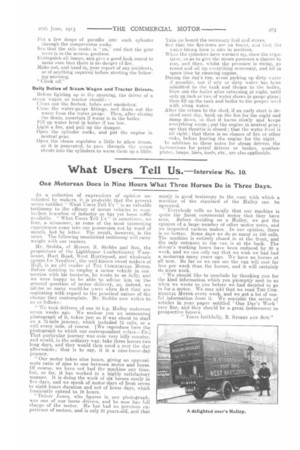Garages for Commercial Vehicles.
Page 28

Page 29

If you've noticed an error in this article please click here to report it so we can fix it.
By George W. Watson, M.I.Mech.E., M.I.A.E.
The author is the Inspecting Engineer of the Commercial Motor Users Association; this article suggests suitable and necessary equipment for the proper care of motor vehicles from the driver's point of view, but it does not deal with the necessary arrange91teltiS for the mechanical repair of such re/dc/es; the latter subject has already been dealt with, in previous articles in The Commercial Motor."
If the owner have any difficulty. in deciding for himself what parts he should keep in stock, he had better seek the advice of the manufacturer who built his machine: It is, of course, the duty of every driver to keep a, daily record of the supplies he draws from stores, such as petrol, oil, grease, waste, paraffin, carbide or any spare parts, and when spare parts are used the owner should at once be notified that they have become necessary, so that the stock may be replaced from time to time.
Appeal to Owners.
In the earlier paragraphs, I have outlined what I consider the minimum standard of accommodation and equipment which should be found in rinitor-vehicle garages, and unless an owner make such provisions he can have only himself to blame if his vehicles fail to run as economically as he learns other. owners are running theirs. 1 am personally acquainted with very many garages that do not come up to this low standard by a long way, and I always feel a great sympathy for the drivers who have to struggle on and do the best they can under Most adverse circumstances. Some drivers will keep their machines in most beautiful condition, even under the worst of conditions, and that type of driver is a credit to the motor industry, but it is not fair on the man that his enthusiasm and thoroughness should be imposed upon by owners to the extent I have found it.
There are, of course, many owners whose garages are infinitely better equipped than the minimum I have laid down, and their vehicles should be all the better for the increased facilities for cleaning and repair, but unfortunately this is not invariably the case, and I am often led to wonder what would be the condition of their machines were their drivers obliged to make shift with the rough-and-ready housing accommodation, or complete lack of it, that prevails in some eases. A bad driver will turn out a bad job, even with the best of tools and equipment: whereas a good driver will keep his machine smart and workable, even without any equipment other than his hands arid any tools he chooses to provide for himself, but it is Unfair to the good driver to expect him to work without proper equipment.
Hints to Drivers.
So far, in dealing with this question, I have appealed to the owner ; I now want to impress upon drivers the necessity for their due and daily performance of many important little duties concerning the care and control of their machines, and I think this can best be done by my setting out, as far as possible in the correct order of operation, the various things which should be attended to daily :—
Daily Duties of Petrol-vehicle Driver.
Before starting up the vehicle in the morning :— See that radiator is full.
See that' petrol tank is full.
Always strain the petrol into the tank. Occasionally clean out the filter between the tank and the carburetter. and sometimes disconnect the pipe between the tank and the filter, and see that same is quite clear : also, when this pipe is disconnected, turn on the petrol tap and see that the
petrol is delivering freely through it. It would also be as well to disconnect the petrol pipe at tne carburetter end, and to make sure that use petrol passage is quite clear to the carburetter.
See that, oil tams is hill, if one is fitted ; otherwise a spare tin ox on should be carried.
See that the accumulatofs are fully charged.
bee that the clutch brake is greased.
bee that the foot brake goes on before the pedal reaches footboard.
See that the side brakes are holding when the lever is half-way up the quadrant.
See that the enange-speed lever is in the neutral position.
See that all drain cocks are closed.
See that the gearbox. has sufficient oil, and that all serew-down greabefs, . after having been charged, are screwed right home • otherwise, they may work loose and be lost on :the road.
See that all brake-rod joints, clutch bridle, and other working parts, are properly lubricated. See that the lamps are properly trimmed and reser voirs filled.
See that the number-plates are quite secure.
See that the 'tires are in a fit state for the journey, and that there are no nails, stones, ragged pieces of glass or metal embedded therein.
See that the regular equipment of spare parts and tools are in their locker, and that the lid of this cannot shake open, and thus enable the contents to fall out on to the road.
See that the throttle lever is set at closed, or nearly closed position. • See that all the ignition-wire terminals are secure. See that the petrol is turned on at the tank, and that it is passing freely to the float chamber.
See that the switch is in the " on " position, and, then, but not until then, the engine may be started up. After returning at night, before stopping engine :— Put a little fresh oil in the crankcase if needed. Turn off the petrol at the tank.
Switch off the ignition, then drain off the water if there is any probability of any frost (unless the garage is suitably heated).
Pet a few the of paraffin into each cylinder
through the compression cocks.
See that the sikle brake is " on," and that the gear . lever is in the neutrai position. Extinguish all lamps, and give a good look round to make sure that there is no danger of fire.
Make out, and hand in, your report of any accidents, or of anything required before starting the following morning.
" Clock off.'
Daily Duties of Steam Wagon and Tractor Drivers.
Before lighting up in the morning, the driver of a steam wagon or tractor should :— Clean out the firebox, tubes and smokebox.
Close the water-gauge fittings, and drain out the water from the water gauge. Then, after closing the drain, ascertain if water is in the boiler.
Fill up water level in boiler if too low.
Light a fire, and pull up the damper.
Open the cylinder cocks, and put the engine in neutral gear. Open the steam regulator a little to allow steam, as it is generated, to pass through the steam chests into the cylinders to warm them up a little. See that the fire-irons are on board, and that the water-lifting hose is also in position. When the cylinders have warmed up, close the regulator, so as to give the steam pressure a chance to rise, and then, whilst the pressure is rising, go round and oil up everything necessary, and h11 in spare time by cleaning engine.
During the day's run, avoid picking up dirty votter if possible, but if oily or dirty water has been admitted to the tank and thence to the boiler, blow out the boiler after returning at night, until only an inch or two of water shows in gauge glass ; then fill up the tank and boiler to the proper level with clean water.
After the return to the shed, if an early start is desired next day, bank up the fire for the night and damp down, so that it burns slowly and keeps everything warm ; put the engine in neutral gear ; see that throttle is closed; that the water level is all right ; that there is no chance of fire or other risks, before leaving the engine for the night. In addition to these notes for steam drivers, the instructions for petrol drivers re brakes, numberplates, lamps, tires, .tools, etc., are also applicable.
































